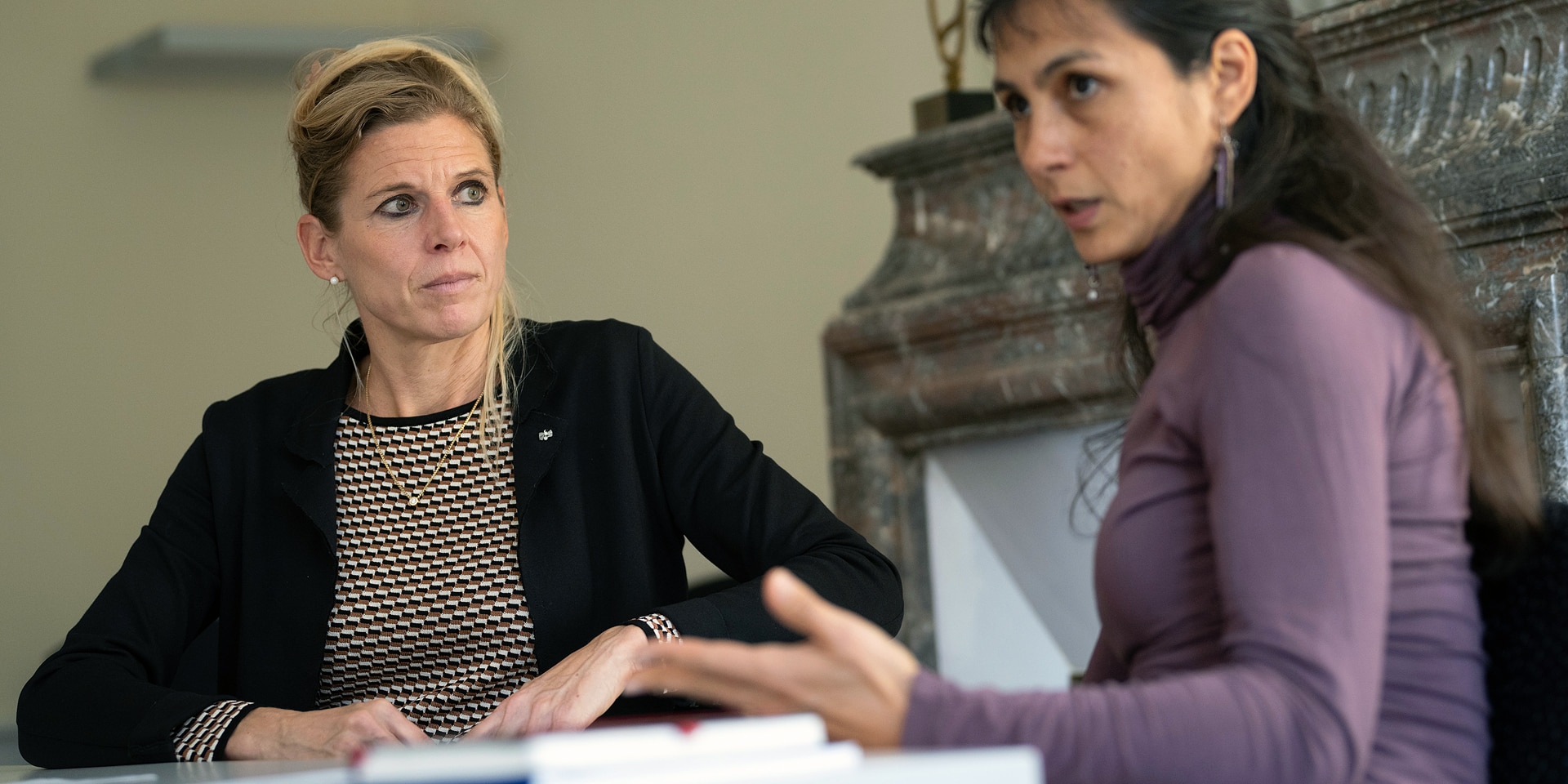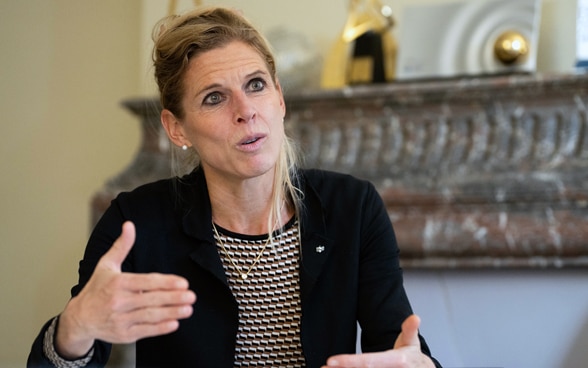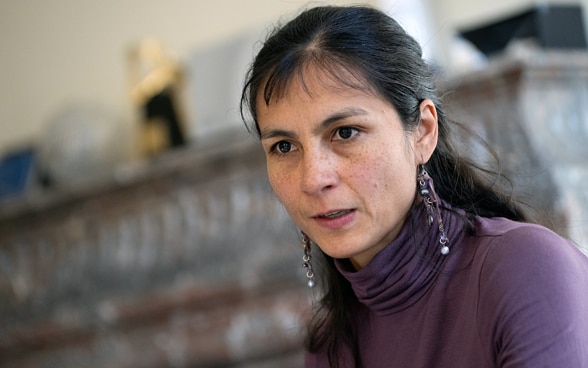"One of the biggest challenges Ukraine faces in relation to missing persons is the large number of cases that need to be investigated."
The FDFA's Peace and Human Rights Division (PHRD) provides crucial support to Ukraine in the search for and identification of missing persons. This support is in keeping with Switzerland's commitment to promoting peace. Two members of the PHRD team recently returned from a working visit to Ukraine, reaffirming Switzerland's commitment to helping Ukraine investigate some 26,000 registered cases of missing persons.

"Establishing what happened to missing persons is essential to national recovery and dealing with the past", underlines Rea Gehring (left), who made a working visit to Ukraine with Sonya Elmer. © FDFA
Ukraine, a European country, remains severely scarred by the war, with all air traffic into and out of the country still suspended. The journey by night train from southern Poland to Kyiv provided Rea Gehring, deputy head of the PHRD, and her colleague Sonya Elmer, with a stark glimpse into the realities of the conflict. In this interview, conducted after their return to Bern, they share their insights with us and discuss Switzerland's contribution to the search for and identification of missing persons in Ukraine.
What stood out the most during your trip?
Rea Gehring: We travelled to Kyiv, a city I had previously visited in April 2022, just a few weeks after Russia launched its military aggression against Ukraine. At that time, Kyiv bore the heavy marks of war, with destroyed tanks, charred buildings and a heightened military presence. Today, life appears 'normal,' but conversations with local residents quickly reminded us that we were not in an ordinary city and that war was raging just a few hundred kilometres away.
Sonya Elmer: I agree with Rea's impression. I should add that we were fortunate to experience Kyiv during an exceptionally quiet time. There was an atmosphere of calm, normality and also vibrancy, almost bordering on the surreal. People's determination to appreciate the present amidst the uncertainty of the future left a profound impression on me.

What insights did you gain during your trip about the search for and identification of missing persons?
Rea Gehring: The search for and identification of missing persons ranks high on the Ukrainian government's agenda. It's also a priority for Ukrainian citizens. A large number of people face a heavy burden, living in uncertainty about the fate of their loved ones. Our field trip made us acutely aware of the indelible scars left by the war across the country. It also highlighted the critical importance and need for the PHRD's support programme in Ukraine. If left untreated, these wounds can lead to societal divisions. Establishing what happened to missing persons is essential to national recovery and dealing with the past. It is a fundamental prerequisite for achieving lasting peace.
Sonya Elmer: To our knowledge, the Ukrainian authorities have reported 26,000 missing persons. The sheer number of cases is a major challenge for Ukraine. When we visited the DNA analysis laboratory, the specialists told us that the number of cases analysed had doubled compared to the previous year. We saw staff operating machines similar to those provided by Switzerland in two decentralised laboratories close to the front lines of the conflict. These machines speed up the process. They're indispensable given the volume of cases. The PHRD has therefore pledged to donate three additional DNA analysis machines to the Ukrainian authorities.
What other major challenges is Ukraine facing in the search for and identification of missing persons?
Rea Gehring: Access to information stands out as one of the key challenges. The PHRD remains committed to fostering dialogue among the parties to the conflict to facilitate the exchange of information. The PHRD also provides financial support to the ICRC's Central Tracing Agency for the conflict between Ukraine and Russia. The Central Tracing Agency works with both sides of the conflict to collect, centralise and transmit information regarding missing individuals. For the Ukrainian authorities, enhancing structures and processes to maximise the effectiveness of the search for missing persons in a country at war represents another formidable challenge, particularly given the intense pressure from families.

How is Switzerland assisting Ukraine in establishing these structures and processes?
Sonya Elmer: For the past two decades, the PHRD has been instrumental in the search and identification of missing persons in different contexts. Our accumulated experience has enabled us to develop an approach that recognises the profound importance of this work for national recovery. We are making this expertise available to the Ukrainian authorities. In Ukraine, our commitment goes beyond merely providing equipment; we are also promoting a comprehensive approach. Every stage of the process, from registering cases and managing the database, to liaising with families and conducting searches, including the identification of missing persons where necessary, is crucial.
What difficulties are encountered in implementing these effective structures and processes?
Rea Gehring: A significant challenge lies in coordinating among the various stakeholders involved in the search for and identification of missing persons. This includes government ministries in Kyiv and their regional offices, as well as regional and local authorities, NGOs and civil society organisations. It's not always easy to find out where specific responsibilities have been allocated. Our trip helped to clarify things. The authorities also stressed their material requirements.
What role does the justice system play in addressing the issue of missing persons in Ukraine?
Rea Gehring: In Ukraine, many cases are dealt with by the criminal justice system. Victims' families often seek redress through legal channels. Nevertheless, our experiences in other contexts, such as the former Yugoslavia and Colombia, have taught us that for the families of victims, uncovering the truth about what happened and understanding the fate of their loved ones is a fundamental step towards achieving justice in the broadest sense of the term.
For us, this perspective underscores the importance of embracing a wider approach. Justice cannot be limited solely to criminal proceedings; it requires a broader framework that incorporates non-judicial mechanisms. Addressing this issue is another key aspect of the PHRD's commitment, and we've also discussed it with the authorities and civil society representatives we have met with. This comprehensive approach involves searching for and identifying missing persons, and sharing pertinent information with their families.


